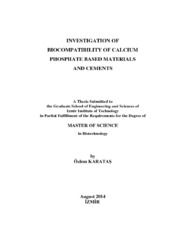Please use this identifier to cite or link to this item:
https://hdl.handle.net/11147/4172| Title: | Investigation of Biocompatibility of Calcium Phosphate Based Materials and Cements | Other Titles: | Kalsiyum Fosfat Bazlı Malzeme ve Çimentoların Biyouyumluluğunun İncelenmesi | Authors: | Karataş, Özlem | Advisors: | Çiftçioğlu, Muhsin Harsa, Hayriye Şebnem |
Keywords: | Biocompability Cytotoxicity Calcium phosphate cements Biomaterials |
Publisher: | Izmir Institute of Technology | Abstract: | Calcium phosphate cements (CPCs) have been extensively investigated due to their excellent biocompatibility, osteoconductivity, potential resorbability in dentistry and orthopedics. They have numerous advantages over other calcium phosphate-based materials. The CPC precursor powders were prepared in the initial stage of this work. Tetracalcium phosphate (TTCP) powders coded as TTCP-1 (obtained from H3PO4 and CaCO3) and TTCP-2 (obtained from NH4H2PO4 and CaCO3) were prepared by heat treatment of the calcium and phosphate source mixtures at 1350°C. Brushite powders were produced by aqueous chemical methods. A series of CPCs (HA cements) were prepared by using the TTCP-1 and brushite powders which were mixed with 0.2 M and 0.3 M phosphate buffer solutions at three different solid/liquid ratios (2.4, 2.7 and 3.2 g/ml) with three different HA initial seed contents (3%, 1.5% and 0.0 wt% ). The setting times of CPCs were determined to be in the 3.5-24 minute range. The phase structure and surface morphology of the cements and precursor powders were characterized by XRD and SEM. XRD analysis of powders revealed the presence of the characteristic TTCP and brushite peaks. XRD analysis also indicated that all cement samples were composed by HA phase with different crystallinity and other phases were not detected. Rod and plate-like hydroxyapatite crystals were observed in the SEM micrographs of all CPCs. Cytotoxicity testing was performed using the MTT (3-(4,5-dimethylthiazol-2-yl) 2,5-diphenyl tetrazolium bromide) assay to determine the number of viable cells in the presence of powders and HA cements. Cytotoxicity results indicated that brushite powder caused sharp decreases in cell viability at the end of 24, 48 and 72 hours at all powder extract concentrations. TTCP-1 and TTCP-2 powders unlike brushite had no toxic effect with cell viability values over 74 %. Almost all CPCs prepared in this work had no cytotoxic effects. | Description: | Thesis (Master)--Izmir Institute of Technology, Biotechnology, Izmir, 2014 Includes bibliographical references (leaves: 54-57) Text in English; Abstract: Turkish and English x, 58 leaves |
URI: | http://hdl.handle.net/11147/4172 |
| Appears in Collections: | Master Degree / Yüksek Lisans Tezleri |
Files in This Item:
| File | Description | Size | Format | |
|---|---|---|---|---|
| 10049183.pdf | MasterThesis | 2.67 MB | Adobe PDF |  View/Open |
CORE Recommender
Page view(s)
334
checked on Apr 28, 2025
Download(s)
202
checked on Apr 28, 2025
Google ScholarTM
Check
Items in GCRIS Repository are protected by copyright, with all rights reserved, unless otherwise indicated.